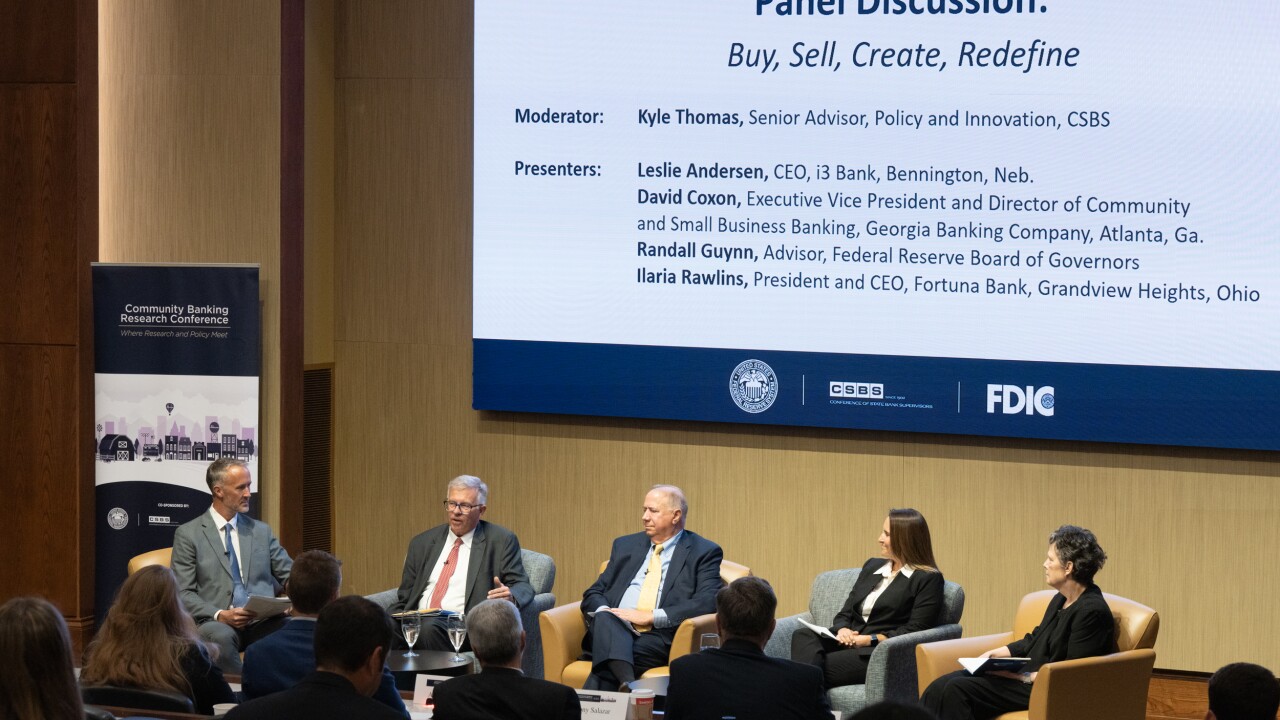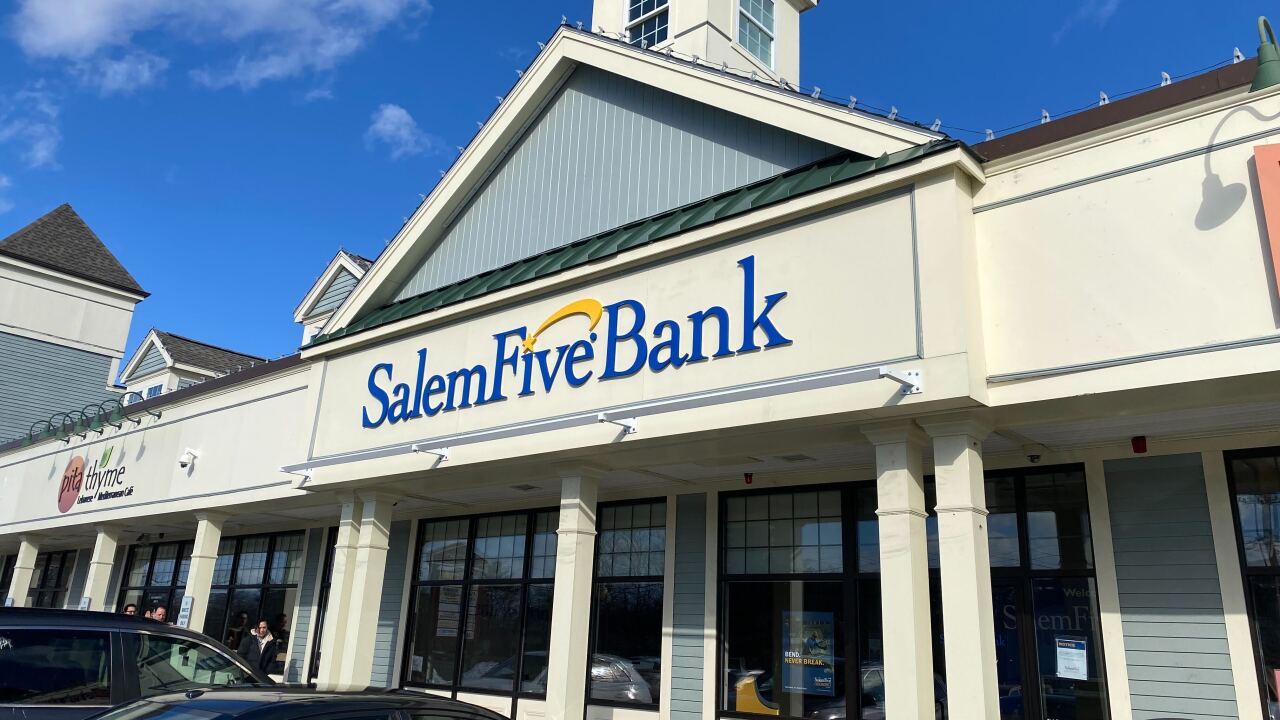
Starion Bank, a community bank based in Bismarck, North Dakota, launched an effort to serve gig economy workers across the country, and in so doing, it expanded its footprint and increased its customer base and total deposits.
The bank teamed up with an undisclosed large gig economy employer and with fintech partners Fiserv and Central Payments to debut embedded finance for contract workers, a project that's one of American Banker's Innovations of the Year.
Many of Starion's new customers were previously unbanked or underbanked. Through the program, workers have access to a full-featured deposit account embedded within the employer's platform they already use to handle work-related tasks. Users receive their earnings instantly and can manage their money within the app — they can pay bills, send funds and add other direct deposits or cash through the platform they already use.
Users immediately receive a virtual debit card upon creating an account and are given the option to receive a physical card as well. Customers have access to perks like cash-back incentives at places like gas stations and are able to withdraw cash fee-free from a network of 40,000 ATMs nationwide.
Thanks to the partnership, the gig employees' earnings are now insured and protected by Starion. Prior to the arrangement, gig workers were paid via prepaid cards. The new method is more secure and easier for users to manage.
"Historically, there weren't gig economy workers, it's an emerging group of workers that is important to the U.S. economy, and, frankly, many international economies as well," said Andrew Gelb, co-head of financial solutions at Fiserv. "Making sure they're well supported with payment options and the ability to manage money effectively is a fantastic opportunity for them and for us.
"Financial inclusion is important, and products like this promote financial inclusion," Gelb continued. "You want to be able to give people essentially a digital version of a bank account and give them options on what to do with their money, and give them features and offers — all the things that someone who had a bank account would want."
For Starion, the upside has been huge: More than 3 million accounts had been opened in a little over three months as of March. The program has expanded Starion's reach beyond its North Dakota base and physical branches in Wisconsin. As Starion customers, the gig workers can easily access other products and services like mortgages and car loans.
"It's all part of the new digital age," said Dave Rogstad, chief banking officer and chief operating officer at Starion. "These fintech partnerships give new ways for community banks to meet customers' needs and reach customers. Instead of the customers coming to the bank, it's a way for banks to really get out there and get in front of customers and reach their needs."

Rogstad said projects like this one are a space that all banks will need to get comfortable with and be willing to embrace to stay competitive.
"There are so many options out there nowadays, whether it's banking or anything else," Rogstad said. "The key is asking, 'What do the customers really want? What's the easiest way for customers to get into banking?' Some people love walking into the bank, but at the same time, some people just love doing everything via app and have everything all in one place. The beauty of this is that they can do their job and they can do their banking all in the same spot."
A point of pride for the bank and its partners is the speed at which the program was developed. Initial discussions began in late 2023 and the first accounts went live in October 2024. Gelb said the ramp-up was fast and the vendor's contract workers quickly joined, noting the program is "supporting a significant number at this point."
"The fact that it moved quickly, the fact that there was quick take-up, indicates that the program is popular and highly successful," Gelb said. "We've seen more interest in these types of programs since launching that program, which I think is the ultimate testimony to its success."
Eric Cotton, president and chief payments officer at Central Payments, said the speed and execution were thanks to all participants.

"The opportunity presented itself and everybody jumped on and put a ton of focus and resources into it," Cotton said. "It was a massive effort on all fronts to go from 'hey, we've got this kind of crazy idea' to launch within less than a calendar year. It proves the dedication and focus of all parties."
Each partner had a tie to another: Fiserv had an existing relationship with the gig employer; Central Payments and Fiserv previously worked together; Starion and Fiserv have a longstanding relationship; and Central Payments said they were interested in collaborating with Starion.
Central Payments was originally founded as part of a community bank. Cotton said the company focuses on areas like regulatory and consumer compliance, funds reconciliation and settlement.
"When we spun out of our original bank partner, we wanted to see if this was a repeatable model," he said. "We wanted to find another FDIC-regulated community bank in the Midwest. We had known of Starion for a while and those discussions were always warm. We thought we had a way to make it work where they are still the regulated entity, but we are able to supplement using our expertise."
Starion as the sponsor bank provided the banking charter and necessary oversight as well as FDIC protection. Along with Central Payments, the bank facilitates access to payment rails. Central Payments also handles regulatory and compliance portions of financial products in addition to risk mitigation and operational support.
Fiserv handles technology aspects of the project like orchestration, servicing, ledger, card process, cardholder self service and digital disbursements.
"They needed a bank that was progressive enough to tackle a challenge like this, and get these partners together to work together," Rogstad said. "We're small enough where we're nimble enough to be able to do something like this. That's one of our advantages being a smaller community bank, we can make those changes."
Rogstad said the specialized nature of the program and specific vendor requests meant it was easier for Starion, a community bank, to onboard in a short amount of time compared to a bank that may have existing structured programs in place.
"We were able to meet the needs of the fintech company, all while doing our compliance, our due diligence, and maintaining all of that at the same time," Rogstad said. "At the end of the day, it comes down to having the right partners within the deal, having those that you can have the conversations with, and being able to say it's not a one-sided agreement. We have four parties. Not everybody was going to win. We all had to come to a compromise and meet in the middle. And really, that's how the whole project got done."




